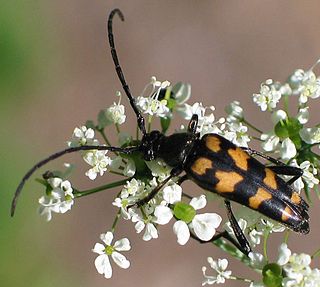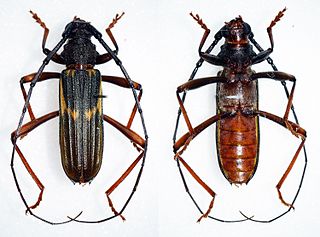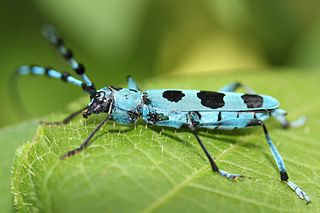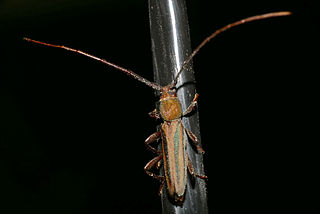| Psebiini | |
|---|---|
 | |
| Nathrius brevipennis (Mulsant, 1839) | |
| Scientific classification | |
| Domain: | Eukaryota |
| Kingdom: | Animalia |
| Phylum: | Arthropoda |
| Class: | Insecta |
| Order: | Coleoptera |
| Family: | Cerambycidae |
| Subfamily: | Cerambycinae |
| Tribe: | Psebiini Lacordaire, 1869 |
Psebiini is a tribe of beetles in the subfamily Cerambycinae, containing the following genera: [1]
- Genus Australopsebium Bjørnstad, 2016
- Genus Bostrychopsebium Quentin & Villiers, 1971
- Genus Bottegia Gestro, 1895
- Genus Capepsebium Adlbauer, 2000
- Genus Chorothyse Pascoe, 1867
- Genus Cleptopsebium Quentin & Villiers, 1971
- Genus Dodecocerus Dalens & Touroult, 2008
- Dodecocerus poirieri Dalens & Touroult, 2008
- Genus Duffyia Quentin & Villiers, 1971
- Genus Frondipedia Martins & Napp, 1984
- Frondipedia charma Martins & Napp, 1984
- Genus Haplopsebium Aurivillius, 1891
- Genus Hovorea Chemsak & Noguera, 1993
- Hovorea chica Chemsak & Noguera, 1993
- Genus Idiopsebium Quentin & Villiers, 1971
- Genus Kabatekiipsebium Rapuzzi, 2015
- Genus Macropsebium Bates, 1878
- Genus Malayopsebium Niisato, 2016
- Genus Mourgliana Holzschuh, 1993
- Genus Nathriobrium Hovore, 1980
- Nathriobrium methioides Hovore, 1980
- Genus Nathrius Brèthes, 1916
- Genus Nesopsebium Fairmaire, 1894
- Genus Paraleptidea Gounelle, 1913
- Paraleptidea femorata Gounelle, 1913
- Paraleptidea longitarsis (Lane, 1951)
- Paraleptidea sanmartini (Zajciw, 1960)
- Genus Pectinocallimus Niisato, 1989
- Pectinocallimus sericeus Niisato, 1989
- Genus Pectinopsebium Adlbauer & Bjørnstad, 2012
- Genus Pembius Quentin & Villiers, 1971
- Genus Plectopsebium Boppe, 1915
- Genus Psebium Pascoe, 1864
- Genus Pseudobottegia Duffy, 1955












